Contemplation

Silence of Mary and Joseph
...at the Annunciation, the choice that Mary makes in her fiat is something altogether different, because it is a choice of the gift that the Father gives her of His Son. This is a gift that completely surpasses her, and it is only in a wholly pure and contemplative faith that she is able to receive it. It is for this reason that this gift plunges her into silence, a silence which binds her to the will of the Father, to the Holy Spirit Who “came upon her” and to the One Who is given to her: her Son. It is impossible for her to communicate this secret.
So Mary keeps the secret of the Annunciation, and she can do so because she trusts Joseph. We share a secret with someone because we trust that person, but sometimes we need to keep silent, and it is the mark of an even greater trust. Mary could ask anything of Joseph, and she asked him to endure this silence. –Father Marie-Dominique Philippe ‘The Mystery of St Joseph’


Personal fiction
As it was in the beginning, is now, and ever shall be, world without end. Amen.
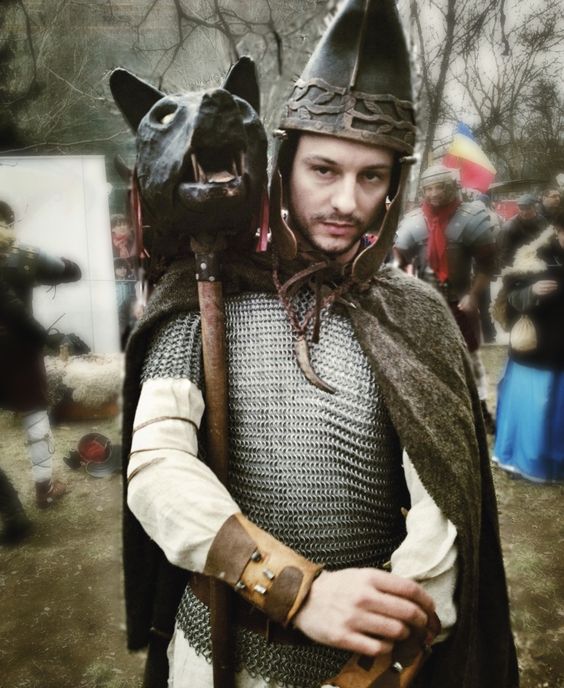
Bogdan, a teenager, was riding ahead of his companions, scouting, distinct in appearance as a barbarian. His constant companions, three large dogs of shepherding heritage, large in tooth and jaw, trotted close. A wolf skin adorned his scalp. The cap was fashioned so the animals front legs draped down the chest, while the rest of the carcass covered the back. It was a large wolf. Rigged to a shoulder harness, penetrating through the skin, a stick rose above his head, making distant riders perceive him as larger than reality. Atop the stick was a wind dragon: the head of a wolf and the hollow body of a serpent capturing the passing breeze. It was the flag of the Dacian people, Black Sea and Carpathian mountain people recognized as barbarians by the majority of the Greco-Roman world.
Bogdan was warned by Amicus, his traveling companion, a former Roman soldier, about presenting himself as a barbarian. The boy paid no heed. The Roman was vicious, yet he considered him a friend. He despised the Romans and Greek, feeling nothing the inferior. Along with Amicus, an elderly Israelite with his grandson and other men of various descents, he worked for a trading caravan traversing Asia Minor. One year was the term of employment. Now he was free of the caravan leader’s authority, proud to be once again the barbarian. The desire to sport the wind dragon was blood deep. It felt good to ride his Thracian mustang hard and fast with the wolf dragon of his youth flying above his head draped in the wolf attire he loved so much as a child. He felt the courage, intelligence, and ferociousness of the wolf lift his spirit.
“So now the boy dresses as he wants and so shall I.” The elderly Israelite responded to Amicus after the boy speedily rode off. The old man bound to his forehead a leather case. ”I am destined for the Holy Land so I will be holy.” He secured his mantle upon his forehead. The old man then tied a similar leather case to his left wrist.
Amicus was pleased with the companionship. His soldiering days, though ending in strife, were rewarding. The camaraderie was invigorating. Always, his companions proved themselves unique in distinction, characters enriching life, individuals alive. Men you were savagely beating with your fist during a meaningless drunken brawl could the next day be the finest of friend. The three who accompanied him now were the remnants from a trading caravan he hooked up with after crossing the Hellespont. There was the Israeli old man and his grandson, as well as the young Dacian boy. Splitting from the trading caravan, the four men unified for a common journey south. The Israelites bound for Jerusalem and the other two for Alexandria and the sights of Egypt.
“The young one is good with horses, yet I hope his bravado does not draw undo attention.”
“He is also good with his bow and arrow.”
“The bow and arrow is for barbarians and cowards. Skill with the sword keeps one alive longer, while proclaiming true valor.”
“I think his sword skills are also adequate.”
“Let’s hope they are not tested.”
“What if they are? Let the barbarian be killed.”
“I have taken a liking to him. Though he is immature, in need of breaking, I trust him. We have all been together long enough to know each other. If a confrontation challenges his life, I am sure he will not be in the wrong.”
“He is not stupid. Yes, I trust him also. Yet I would let the barbarian fend for himself.”
“You are older, maybe when you were younger there was more fight in you.”
“No it is not my age. It is my way.”
“Then we have differences companion.”
“That we do.”
The grandson of the old man interrupted the mounted conversation. “Bogdan saw something. Look at him racing toward us.”
“That child rides like the wind.”
“He is good upon a horse, yet I am better in a chariot.”
Bogdan stopped his horse with great aplomb, dirt rising everywhere with the coming of him and his steed. The horse snorted, also enjoying the dramatics of its arrival. Tossing its head to the left and the right, the stallion radiated energy.
“What is it Bogdan?”
The boy arrogantly laughed aloud, a common reaction for the youth. Pirouetting his horse, the lad screamed. “A Roman legion marches upon the highway.”
“I hope they did not see you racing off like that. They will send spies.”
“They could not see me.”
“That is what you think.”
The boy rode up and challenged Amicus, looking him squarely in the eye. “They did not see me.”
Amicus did not mind the spirited youth. Arrogance did not bother him, as long as it was wielded by one who deserved to be so, arrogance was a virtue, a sign of pride that would not waver upon the battlefield, something natural for an independent young man who desired to survive. Humbling came with time, in defeat or victory, arrogance grew thin. Amongst the caravan, in a professional environment, the boy was competent with tasks and shrewd in interactions, yet now free for an adventure Amicus saw the warrior within the boy emerge. The donning of his traditional garb was the budding of a new man.
“You know I have trouble with Rome. It is best we stick to the back roads.”
“I myself am not inclined to hosting Roman soldiers. Back roads it shall be.”
Amidst camp, settled for the night, seated around a fire, Bogdan held still beneath his wolf-skin cap. Amicus found wonder in the image of the boy, the dancing firelight illuminating the stalwart warrior within the animal skin. Amicus saw the boy possessed strong daemon, a spirit predestined for maturity. Amicus realized he knew little about the youth’s past. The youth impressed him with his abilities and intellect, yet familiarity remained a mystery.
“We have been companions for some time Bogdan, yet I know nothing of your past.”
Bogdan raised his head. His face, instead of the wolf snout, was now visible.”I know little of you either. I do know you enjoy the strong drink the slobs of the caravan indulged in. Also, that you fear Roman soldiers, after once being amongst their rank. You have the mark of the Roman legions tattooed upon your arm. I have seen it though you try to hide it. I honor your secrets.”
“Maybe one day, I will tell my tale. Yet tonight I want to know yours. Now I see you in the guise of the wolf and desire to know about your past.”
The old Israelite, still with the leather case strapped to his forehead and one upon his left wrist, chimed in. “Yes child, tell us about your youth. Repose and speak.”
Bogdan after a day of racing with the wolf spirit felt empowered. His story flowed easily.
“First you are wrong to call me a boy. I have only lived a short amount of years in your mind, yet my suffering has been great, calling into question my very existence. I was raised amongst the Dacia people, barbarians to the Hellenistic mind. Yet the Greeks do not know my people. Wealth exists in Dacia. More and more of the wrong powers understand the fact. Beyond materialism, there is hidden wisdom, and a noble code of the warrior that all surviving people must establish. Come catch the deadly arrows of our swift horseback warriors if you think you are warrior enough. To be weak is to offer your children no hope of a free life. Dacian children live free and proud, hunting with skill and zest. As a child, I was one of the best in shooting arrows. When I pulled back my bow, destined for Hades was my aim. My confidence with my bow is not because my fellow Dacian hunters are poor hunters, rather my greatness is achieved through their supremacy. I proved myself the best amongst the best.
“Dacia is a land grateful to be anonymous from the Greco-Roman world. I see the culture and Gods of Greece infiltrate the Roman mind. We forsake these gods and their pretentious ways for a higher truth. Greek philosophy teaches of virtue and knowledge, the advancement of civilization through the daemon of advanced men, yet their Gods are imprudent, and their culture is brutal and decadent on to their own. Elitist of the worst kind are these men of vice and pleasure. We have wise men in mountains, holy men, who teach such thought is foolishness, arrogant in nature, worldly and vain. The others of our kind seek simplicity, cherishing family and the love of neighbors, abhorring those would rise above his brothers and sisters in order to rule, or self-glorification; one for all and all for one. We spurn the disdainful Greek mind while not feeling the need to debate it. Grounded within the Vedas, trusting in an all-powerful God, the true higher authority, our wise men submit to humility and the practice of meditation, taking to caves in the mountains, hiding from men, practicing the sound Om, both listening and voicing, pleading their case with the eternal rather than man.
The old Israelite was laughing at the words of the young barbarian. The youth was not wounded. He heard a compliment, rather than an insulting. The youth felt the ears of his friend, another youth, the young Israelite, tuned to his story. He respected the lad, growing in attachment, desiring his friend to know him greater.
“As a boy, I spent time with one of these holy men of the mountains. It was a time that marked me for manhood, a transitional period. It was the harvesting time, the end of summer, and before the cold of winter. I must tell you about the time before my formation with the holy man. Raised amongst farmers, workers of the land, my childhood was idyllic, my family grand. My father was a noted man for his size and strength. Dacians are smaller people, yet his size was as great as the Germans. In competitions, few Dacians could match the feats of my father. We Dacians love to play and gather for communal fun. All are welcome. None the greater, none the less, and all feast like kings. We compete amongst one another with the greatest effort, yet victory is only impressive when achieved in humility and valor. My father was a grand champion. He specialized in wrestling upon a large oil slicked rock. None could dislodge him. He had no enemies amongst his people. A great fighter, he was only greater in loyalty. God strike me down if I ever think a bad thought toward the man.
“I was not like my father. I was not so large. Where his hair was black and thick, mine was sandy in color. Where he was strong and somewhat simple of mind, I was shifty and clever. Now, I tell you of the incident before my time with the holy man. There was a woman, Ligia, who would visit amongst our village, daughter to a man who worked the land north of our farm. Dacian women are known for their fierceness, entering battle with their men. They are not like Greek women, silently taking a backseat, nothing more than property. Dacian women sit on council seats, assisting the men in acting for the people. Ligia was renowned for her achievements in battle. She so loved the conflict of war, she never married as she ventured, camp to camp, seeking warfare. Wherever the Dacian people needed a strong hand with the sword, there she made her home.
“Ligia would hunt with me, tolerating my brashness for I always wanted others to know of my advanced skill with the bow. Easily, I took three times more rabbits than her. A girl would never beat me with the bow. On our final hunting spree, days before my father advised me to seek council with the holy man of the cave, Ligia sat with me aside a river, talking serious. She told me of my father’s bravery. How during raids to the south, into and beyond the lands of our hated enemy the Thracians, my father held second to none. Many a Dacian men could thank my father for seeing the sun this day.
“Ligia told there was something my father hid from my sisters and myself. I was not born a Dacian. My sisters were. As an infant, I was kidnapped during a raid of Thracian land. Ligia assured me that this no longer mattered. I was a Dacian in daemon. She tried to say more. She forced a promise. I must not inform my father. I must be careful not to act differently. She assured me my father would know from my behavior alone.
“So you see my fellow travelers. Holding to nothing of greater esteem than being Dacian, I learned I was Thracian in birth. My mother and father was the enemy I hated. I returned from hunting with Ligia, after dinner my father took me aside and spoke with me. How he knew I knew I do not know. He saw something in me changed. The man loved me and in my heart is nothing but love in return. He wanted for me to seek counsel with the holy man of the cave, as he had done as a youth. The farm would be busy with the harvesting and he could afford to be without my labor.
“I set off for the mountains confused, yet grateful. I was happy Ligia acted as she did. I loved my family with all my heart, I would die for them. I was Dacian. However, there were matters that hinted the truth throughout my years. Truth, I hold above all things.
“My time with the old holy man was a struggle. I knew the man knew of me, and it was an honor to be hosted by him, yet his indifference nearly drove me away. He said nothing. I sat at the back of his cave watching. He would meditate for long hours. The other times, he would read from scrolls, or perform menial task around his cave. There was no sacrificing or rituals as I could see. His belongings were few. I tried to make myself useful, gathering water, and supplying meat. Vegetables and herbs, he would gather himself. He liked to cook, continuously praying, offering thanks, as he did. Finally one morning, he spoke final words to me.”
“Your father has come and killed your father. Understand. I am your true father. Know what you have seen. Know what you have heard. Know what you have experienced. Keep my scrolls for today I go.”
The old man spent the day building a pyre, a huge gathering of wood he expertly constructed, soaking the wood with pitch as the day concluded. As the night firmly settled into darkness, he appeared with a final bucket of pitch and a torch. Then I knew his intentions. He climbed to the top of his work, dousing himself with the flammable pitch. He ignited the wood supporting him, reclining into the flames as his body merged with the roaring flames. The Greeks have an idea I learned Apocatastasis. Awestruck, I watched the fire engulf the pyre. The fire grew to enormous proportions. In the brightness and heat, the old man was lost.
Throughout the night, I watched the fire. I knew I was no longer a boy. I knew not what the future held, yet whatever it did possess I would greet it as a man. In the morning, the fire still smoldering Ligia appeared.
“You have been with the man over forty days, beyond a full cycle of the moon. He told me to come for you when the fire came. What have you learned?”
“Nothing. He rarely speaks. He meditates, reads, and cooks in silence. Sometimes he sings, always he prays, yet it is an ancient language I do not understand.”
“You have sat with him?”
“Yes. I tried the breathing.”
“He did not lead you?”
“At times, he did. I would match his breath, concentrating as he instructed.”
“That is good.”
“It was nothing.”
“No. It was a lot. You will discover this later.”
“There was something he said that struck me. Guiding my breath, he told me to focus away from my thoughts, ignoring them. No matter how good or bad, they meant nothing. My breathing was central, devout meditation can only be won through battle. Then after several days of practicing in such a manner, he informed me I was doing everything wrong. I was watching myself and this was no good. As I meditated, there I was still watching, critical and proud. He stood above me, holding his hand above and behind my head, saying here you are now, observing, unable to penetrate inward. Your left hand must not know what the right is doing. I was not sure what he meant, believing he requested the impossible. I did not desire to be a holy man. I am a hunter and warrior. It all seemed foolish.”
“That is what he said? Think stronger.”
“My time with him is vague. It is difficult to remember, even during a time when the one who never spoke finally spoke. It seemed he never spoke, yet he did speak in rare moments.”
“Tell me more about the times he did speak.”
“Hold on. It is difficult to recall his words as they were consistently difficult to understand. It is hard to restate them and make sense. The old man told me I existed within two parts. He talked of an actor and an observer, one that observed and one that acted. He wanted me to understand that the one who acted should never be judged by the one who observed. The one who observes must not judge, rather the observer must learn, studiously garnering an education. Victory or defeat means nothing. Good and evil are traps waiting for those involved within action. Consequences are not essential. In victory one could lose, and within defeat one could achieve. The observer must persevere, holding to love and patience, trusting and silent in judgment, growing in strength.”
“Were there wolves at night?”
“Yes. They came several times, just beyond the light of our fire. I could see their eyes and hear their threatening breath.”
“Did you look for tracks?”
“Of course. None were to be found.”
Ligia lowered her voice in tone.”The old man is consumed. He wants me to tell you that it is your destiny to see the world. You must keep the memory of him and the wolves in your heart. Strengthen the observer as you wander. You will become the master of your own pack, dogs as your companions. Last night, he came to my sleep, speaking. You are to journey to Egypt. What is there, you may never know. Do not return to your adopted family. There is nothing there for you. Your real father was searching for you. He has been for years. He loved your birth mother. It was her beauty, your adopted father desired. When kidnapped, your mother would not release you. As a baby, you were also abducted. I knew of your mother’s demise. I was with your adopted father during her death. Traveling to Dacia, she fell into the icy water of the Danube, a river crossing turned lethal. A relentless fever attacked her afterwards. She would never recover.”
“I hope she did not suffer. She was beautiful?”
“We all suffer. Your mother was a grand beauty. Her beauty cost a life. Your father has been drawing near. That is why I told you the truth. The holy man told me to visit your adopted family for I would find a terrible thing. Indeed, I did. Your fathers fought with the sword, both dying in the altercation. It was night and I looked to the mountain where I knew you to be. I witnessed the signal fire. The fire the holy man told me to watch for. The holy man went for the souls of your fathers in order to assist them. It was the time of your calling. Your adopted mother will not welcome you. She is crazy wit h grief for her dead husband. She has not turned her daughters against you.”
Ligia reached into her pouch.”I have something for you.” She handed me a necklace. I recognized it as the work of my sisters.
“Your oldest sister spoke with me. She gathered her sisters. Together, they made this for you. They want you always to wear it so you will have love close. All the girls kissed the necklace with tears. Their hearts are broken by the loss of their father and you.”
I observed the necklace. It was simple, yet wonderful. It brought tears. I recognized the leather strand as one my eldest sister would wear around her hair. She transformed it into a necklace. She adorned the strand with four rocks of various colors, precisely piercing their centers with a drilling device. She was a lover of rocks and flowers, collecting those of uniqueness. Since a girl, she was making her own jewelry. Her jewelry was growing in popularity amongst the local women and girls. I would be proud to wear the necklace filled with the love of my sisters. I tied the strand around my neck and felt the strength it built within me.
“I am a man now.”
“Yes a universal man. One nation is too small to hold you.”
“I will know the world, first on into Macedonia.”

Side Menu Note
I have posted a new collection of photographs, ‘Museum of Divine Statues: Former St Hedwig‘, from an amazing Catholic hideaway in Lakewood, Ohio. We spent the afternoon lingering at the former St Hedwig church, now splendidly being presented as the Museum of Divine Statues. The proprietors have done an amazingly high quality job of restoring, displaying, and preserving the holiness of statues from defunct Catholic churches throughout the Cleveland diocese. Every aspect of the Museum of Divine Statues evokes a sense of care, high-quality, and authenticity. Utilitarian, the lighting, sound, and electronic displays possess an exquisite attention to fine detail. Visitors are supplied with a tablet able to scan QR codes for instant information on individual statues, stained glass, and other items of interest. The cost for admittance is ten dollars, easily justifiable once the professionalism and extensive effort behind the display is comprehended. It is a must visit for those relishing their Catholic faith.

In innocence nostalgic thoughts
Our Lady’s Knight

“‘A peaceful sky, there are such things,’ I recalled from a popular song; and now I marveled at it. A rainbow high, there are such things,’ and I was thrilled by it that morning. ‘Have faith and trust in what tomorrow brings; you’ll reach the stars, because there are such things,’ the song continues. Believe me mother I do have confidence in it. I’m willing to prove its worth, even with my life. As I speed through the blue sky and soar gallantly through the universe, I feel as if I were peering dauntlessly in search of anyone or anything that may tamper with, endanger, or plot against the things we Americans love you and cherish. I am absolutely certain that life, liberty, and the pursuit of happiness–the things we love so much, the things that men like myself sacrifice their human existence for–shall continue to be realities in America. There are such things, and there shall always be such things in America! ‘
There Are Such Things
A heart that’s true, there are such things
A dream for two, there are such things
Someone to whisper “Darling you’re my guiding star”
Not caring what you own but just what you are
A peaceful sky, there are such things
A rainbow high where heaven sings
So have a little faith and trust in what tomorrow brings
You’ll reach a star because there are such things

A story to ponder, saints to admire
Healing the Eight Stages of Life
Ann had tried unsuccessfully for twenty years to help her son Tom who kept angrily withdrawing from the family. Tom had acted this way ever since his difficult birth followed by many days in an incubator. During that time, Tom, alone and separated from his mother’s love, struggled to survive. Now twenty years later, Tom still lived as if he had to struggle to survive alone. His mother still found that the more she tried to love him, the more Tom would distance himself. Finally, Tom eagerly left home for college and had little desire to ever return.
One day Ann decided to hold Tom’s photo on her heart and ask for the love of Jesus and Mary to flow through her heart and change her son. But after praying this way for several days, she discovered that Tom was only getting worse. When she asked herself “why?”, she was shocked to discover that, even while she prayed, her love was conditional on Tom’s changing. She took the photo again and prayed for Tom, allowing Jesus and Mary’s unconditional love to flow through her even if Tom never changed. As she closed her eyes and prayed, this time she saw her son in a blue sweater rather than in the suit he wore in the photo. A few days later she saw this same sweater in a department store and bought it to give to Tom at Christmas.
Several months later Tom came home for a short visit and said, “I don’t know why but the last couple of weeks I’ve been eager to spend some time at home, perhaps stay during Christmas. Maybe you can put in a word to Santa Claus that I want a blue sweater like all the fraternity brothers have”. Tom then describe the exact same sweater Ann had seen in her prayer and had bought two months ago. Ann laughed and said, “We will have Christmas now!” So she pulled out of her secret hiding place the sweater Tom had just described for the first time. Ann told Tom how she saw the sweater as she prayed for him. Tom was amazed at how much God loved him, even telling his mother to get him a sweater two months before she knew he wanted it. They held each other and cried as they experienced how God was healing their relationship. Now they go for long walks together and share their hearts.
Prayer guarantees no fast or infallible solution. But if we love one another with the depth of Jesus’ unconditional love, our hearts–like Ann’s–will change even if our Toms do not. When we pray for another, that person may receive or reject the love of Jesus. But the more we give the depth of Jesus’ unconditional love, the harder it is for another’s heart to keep rejecting our prayer. Even stubborn Saint Augustine held out for only seventeen years when facing the prayer of his persistent mother, Saint Monica. Augustine’s stubbornness made Monica a patient saint. We simply pray and leave the results up to God who will deepen our love and is always full of surprises. Ann never would have guessed that a blue sweater would heal Tom. So too, Saint Monica prayed that Augustine would stay away from wicked Rome. But God’s answer was to send Augustine to Rome where he met Saint Ambrose who converted him.


Chillicothe Sunday reflection
In dedication to refinement, slowing life down, reducing and creating space within time, the weekend of theatrical entrainment in Chillicothe, Ohio has proven to be a blessing. The Tecumseh outdoor drama is an extravaganza that only a witnessing can do justice, the daylong event monumental in educational experiencing. The backstage and living history tour revealed the seriousness of the play as it was understood the actors and actresses come from throughout the United States in order to participate in the small town Ohio performance. The young lady spending quality time with the tours, sharing her life and aspirations, performing the role of Tecumpease (Sky Watcher)—the sister of Tecumseh (Panther Passing Across the Sky), hailed from Washington D.C. Her father was in attendance, for the first time observing his daughter perform in the play, requesting photos of his daughter as he noticed me taking pictures. The play is amazing. The outdoor theater is incredible to experience, the flow of action possessing a depth and stunningly sensual and visual arousal. Horses running through scenes, charging up and down side hills, a pond midfield for passing—canoes paddling across, beyond a distant tree-lined path populated by scene enhancing background characters, two side stages with rocky formations for various elevations of acting, characters talking and acting while ascending and descending, explosions, smoke and the incredibly loud sound of muskets being fired, fighting scenes of impressive frenzy, campfires, Indian and settlers dancing—all historically accurate and powerfully told with compassion and sensitivity perceiving a greater truth. Wonderful and absolutely exhilarating to behold. The play is deeply entrenched with the small town life of Chillicothe, a forty-plus year history dating back to 1973. Today we have decided to lounge about the Greenhouse bed and breakfast. The Victorian home in the heart of downtown surprised with location, providing in its backyard St Mary’s, the downtown Chillicothe Catholic Church. Attending morning Mass proved to be a short walk away. Typing right now, I am listening to the ringing of Angelus bells from the Church. The proprietor of the Greenhouse informed us St Mary’s, possessing a large painting of the Assumption of Mary, recently experienced a massive renovation. Witnessing the interior of the Church, I was surprised by its lack of decoration, settling into the clean bareness, the freshness of soft colors—cream yellows and lighted blues, the only attention grabbing statues being Mary and Joseph standing together. Joseph is larger in size and impression, holding the infant Jesus. The high ceiling church provided a sense of spaciousness, freedom of movement, especially with respect to the pews, allowing plenty of room between pews, one able to easily walk down the pew even with kneelers placed upon the floor. I delighted, possibly over-romanticizing, in the small town ambiance of the parishioners. Reflecting, I imagined the structure of the socializing being based upon familiarization, relating matters to the idea that if one desired to be left alone, able to be whomever one desired to be, free to come and go in identity, delusional and deceptive in presentation, one needed to reside within the city. Within the overcrowding and chaos of the big city life, solitude and seclusion remained intimate. Strangers are always to be met and interacted with. If on the other hand, one desired for others to know everything about one’s self, including family and personal history to a degree even greater than the possessor, a small town was the life to pursue. In a small town, mystery and delusion is forcefully removed. Everyone knows everyone else’s business. Dee, the owner of the Greenhouse, talkative and lovingly sharing in her home, a retired schoolteacher of eighty-one years, active as a wife, mother, and grandmother, demonstrated the relevancy of the matter when discussing the fact she is without a church at this time. Complications arising from a new minister banning the retired minister from the Presbyterian church she has attended for all of her life has caused her and many of her friends to abandon a church of lifetime attending. It is the first time in her and her husband’s long life they have experienced such a quandary. During the Mass at St Mary’s, I cherished the people surrounding. A farming family, as I envisioned, sat directly in front of us—three generations present. The attractive teenage children, two stout boys and a rustic beautiful tomboyish girl, stunning in her sundress, possessed a distinct simplicity and wholesomeness. The same for the granddaughter’s expressively and expansively decorating the walls of Dee’s home in splendid photographs. The idea of families resonates, central to life being the intimacy of intimate relationships. The Tecumseh play shared in the expression, expanding and bursting ideas, with the reality of the Shawnees lived lives contrary to Christian lives, yet absolutely centered within the family unit. Brothers, sisters, mothers, and fathers central to the tribal unity, formation, and survival of the Indians way of life. The Gospel reading today, during the Feast of the Assumption weekend—the bodily ascension of Our Holy Mother into Heaven, evading the ease of black-and-white scenarios, passing beyond declarative statements, the concreteness of right being a matter of proving others wrong being usurped with Jesus declaring mysterious words to be pondered:
“I have come to set the earth on fire,
and how I wish it were already blazing!
There is a baptism with which I must be baptized,
and how great is my anguish until it is accomplished!
Do you think that I have come to establish peace on the earth?
No, I tell you, but rather division.
From now on a household of five will be divided,
three against two and two against three;
a father will be divided against his son
and a son against his father,
a mother against her daughter
and a daughter against her mother,
a mother-in-law against her daughter-in-law
and a daughter-in-law against her mother-in-law.”
Lord teach me to be open and willing,
Courageous and healing in intimacy,
Loving and hungry while content with non-doing.
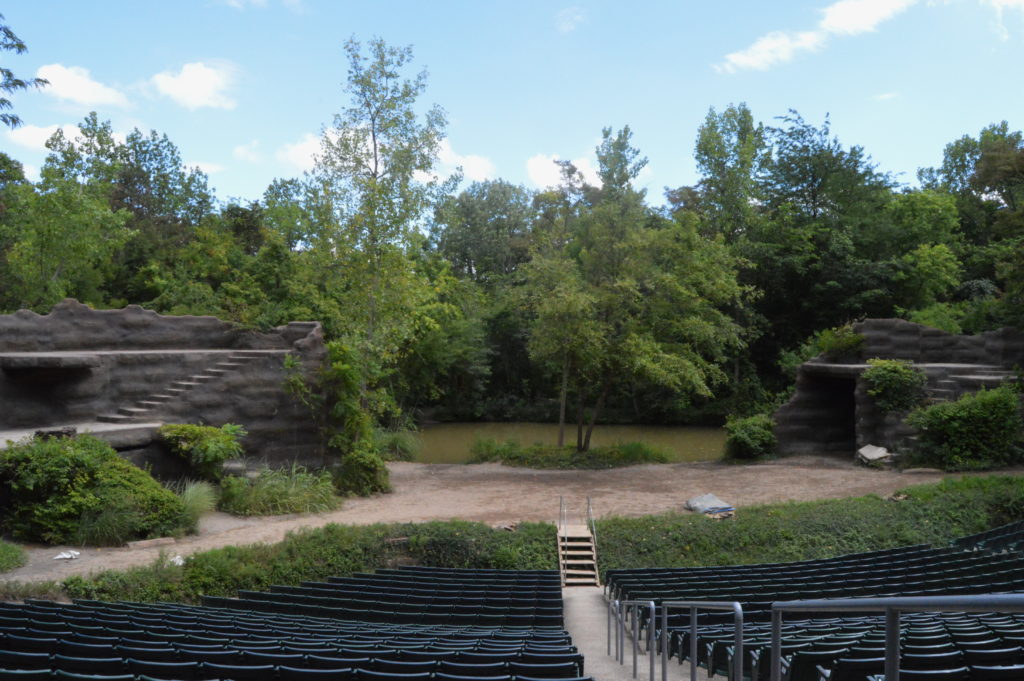
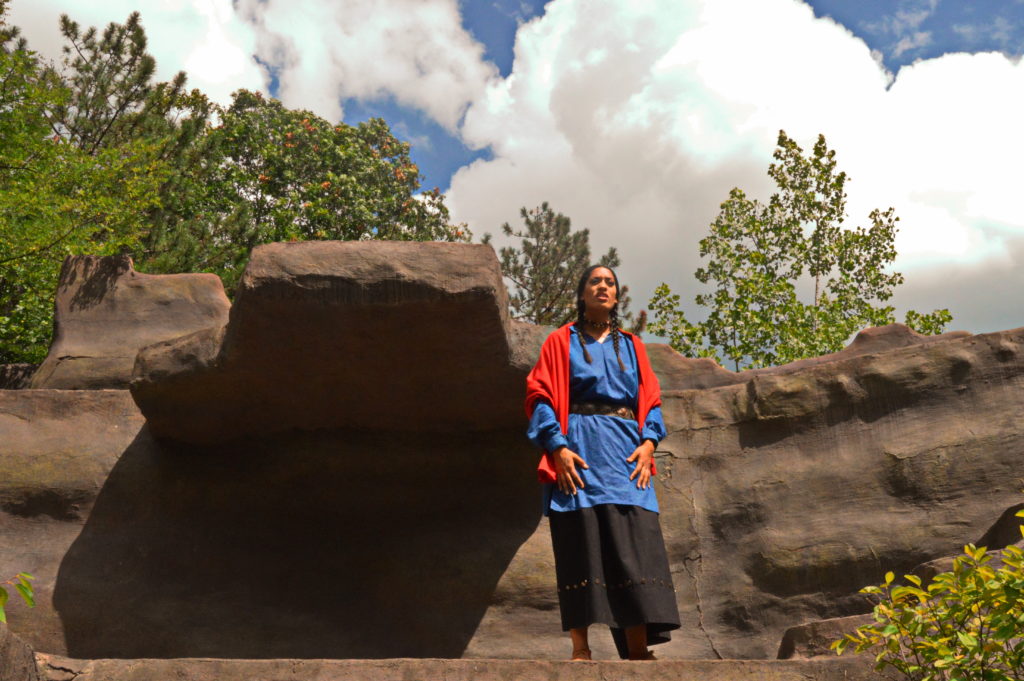
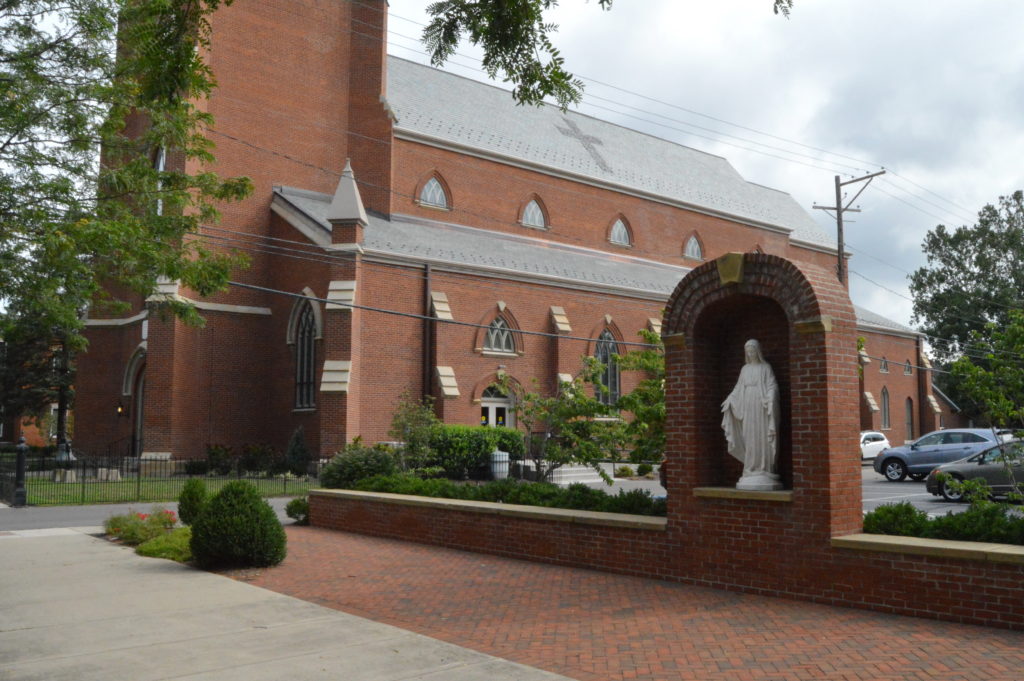
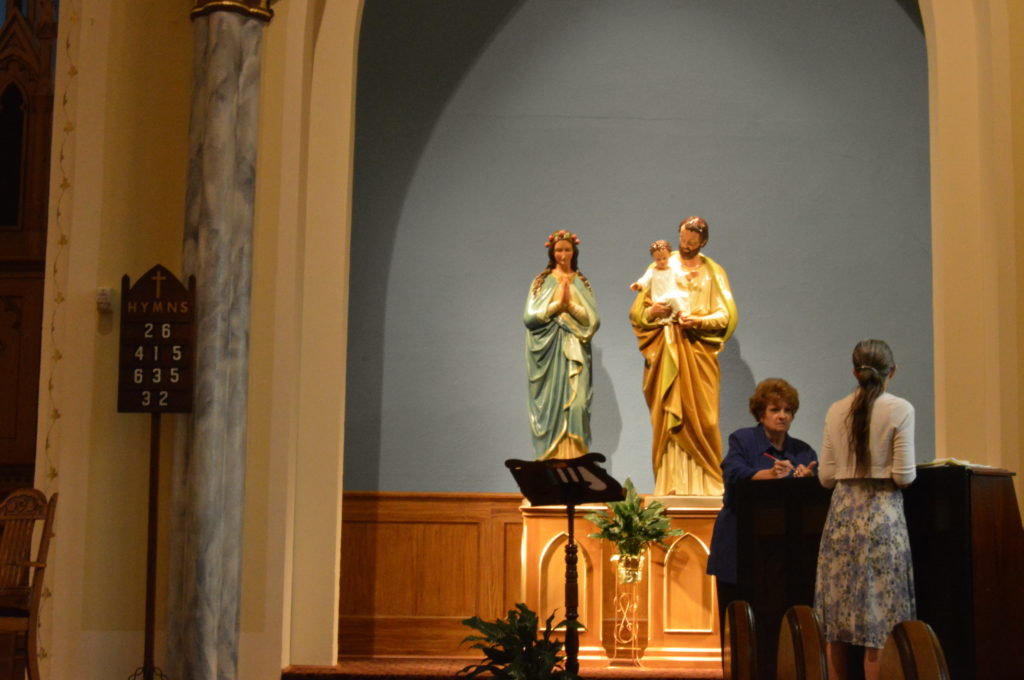
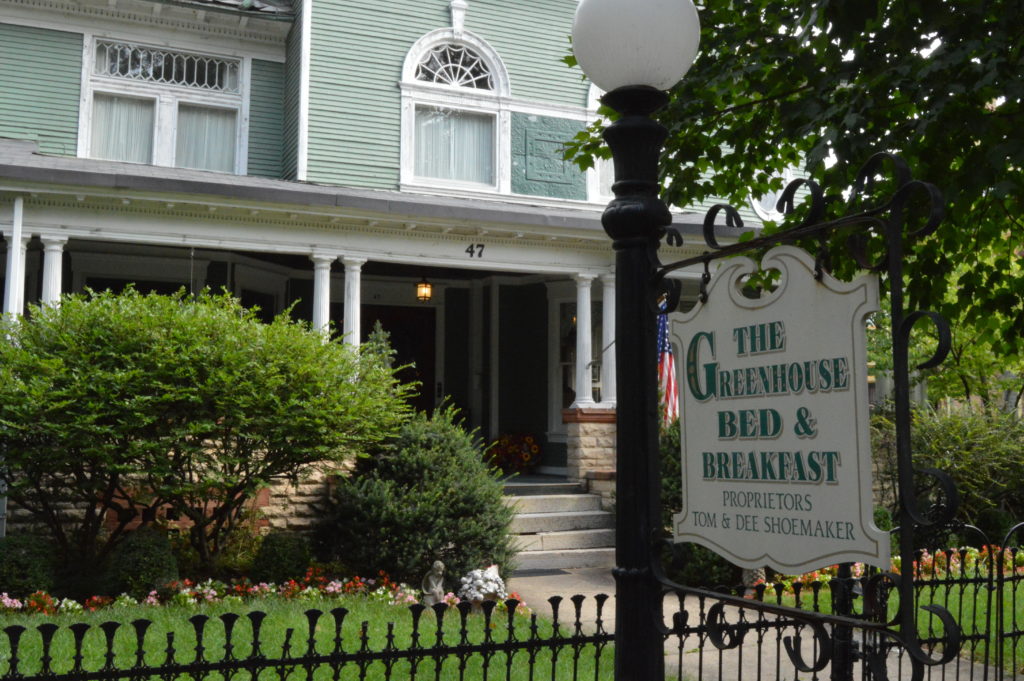
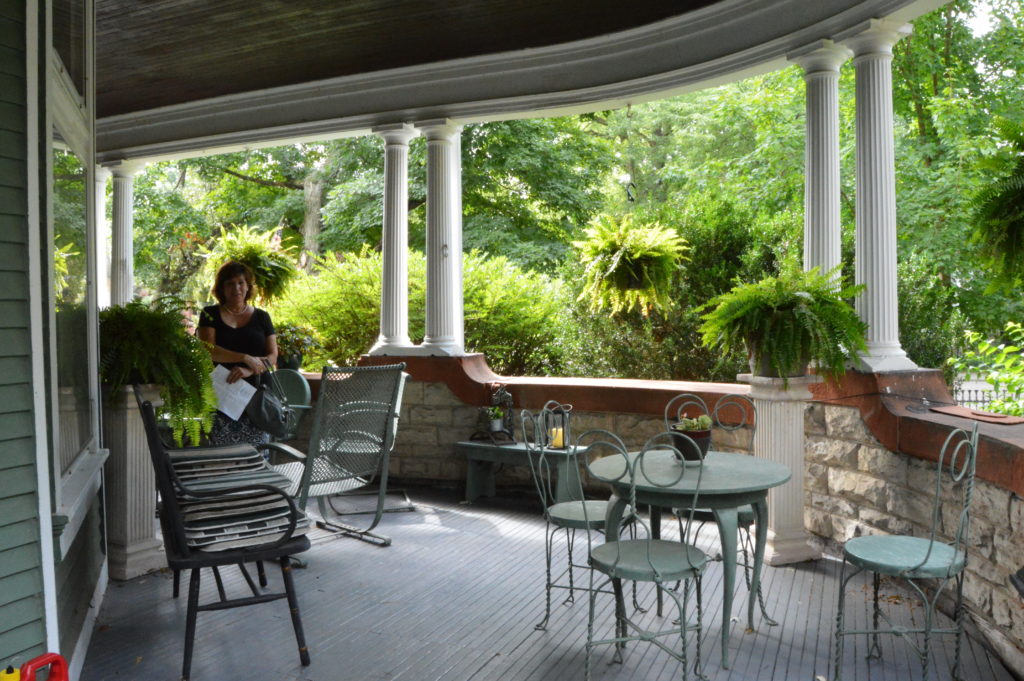


Recent Comments